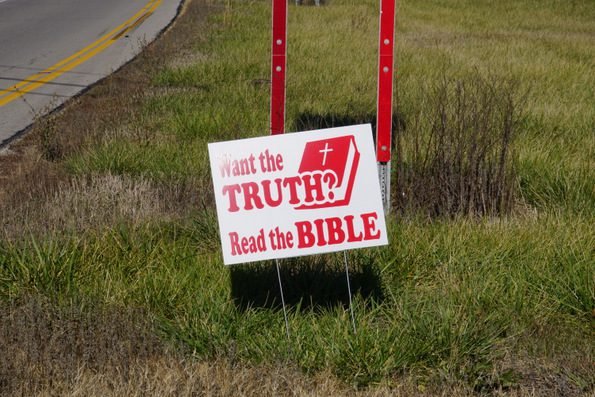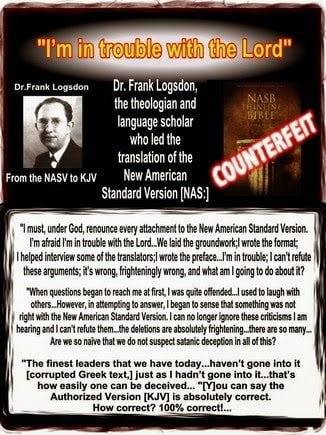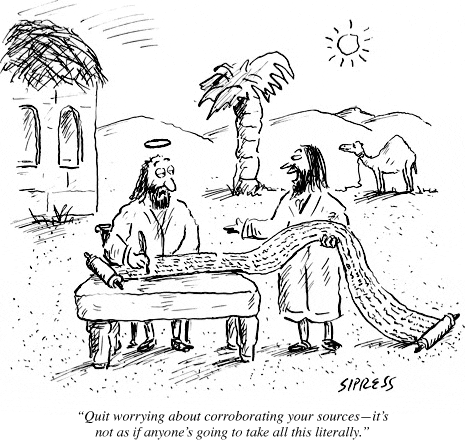
Several days ago, I received an email from an Independent Fundamentalist Baptist (IFB) zealot named Noah Zielke. Zielke ignored my requests on the Contact Page and emailed me anyway. What follows is my response to him. Best I can tell, Zielke is a computer science major at the University of Alabama. I do give him credit for reading some of my autobiographical material, along with a few posts about the IFB church movement.
I publicly responded to Zielke’s email with a post titled IFB Zealot Says He’s Surprised God Hasn’t Killed Me Yet — Part One. As I expected, Zielke responded to my post with another email. What follows is the text of his email and my indented and italicized response.
Thanks for the response, I have only a few points to reply:
Yes, you ignored or disregarded pretty much everything I said.
In regard to: “It’s evident your momma didn’t raise you right, that you lack basic decency and respect for other people. This is a common trait among IFB Christians. What kind of person goes around calling people he disagrees with “stupid”?”
I assume you are being a bit tongue-in-cheek having read your other content, but if not, this is pretty hypocritical. One of your flagship articles is practically a treatise on how much you hate evangelicals, but you abstract this by making it seem like you just hate the “Jesus” that we have apparently constructed (which you just use as an effigy for us).
No, I was not being tongue-in-cheek. Going around calling people who disagree with you “stupid” is indecent and disrespectful. Outside of Donald Trump, you won’t find me saying anywhere that I hate anyone. Sorry, hating people is not in my DNA. Oh, it was at one time. Love what God loves, hate what God hates. And since God hates sinners, Christians should too. Such thinking caused untold harm to self and others.
I am a plain-spoken person. People who “misunderstand” my words typically do so on purpose — as you are doing here. If I “hated” someone, the readers of this blog would know it.
You reference the post Why I Hate Jesus in your thinly veiled attempt to smear my character. You are certainly not the first nor the last person to attempt to do so. Rather than take what I wrote at face value, you choose instead to attribute ulterior motives, and in doing so, attack my character.
The aforementioned post is difficult for Fundamentalists, who are Bible literalists, to parse. Such people have a hard time understanding metaphors. I don’t hate Jesus — he’s dead. I don’t hate people — including Evangelicals. So what do I mean when I say in this post I hate Jesus? As you discerned and then quickly turned it into a personal attack, the “Why I Hate Jesus” post is about Evangelical beliefs — not flesh and blood Evangelicals. It is Evangelical beliefs I hate, not Christians themselves.
I make no apology for my opposition to Evangelical beliefs and practices. And let me be clear here, I vehemently oppose Independent Fundamentalist Baptist (IFB) beliefs. The IFB church movement is a cult that causes untold heartache and pain. IFB churches and colleges are dying on the vine. I hope I am alive when the movement draws its last breath. I would love to be the one holding a pillow over the IFB movement’s face, ending its reign of psychological (and at times, physical) harm. Do I “hate” IFB preachers and church members? Of course not. I have family members who are IFB preachers, evangelists, and missionaries. I regularly interact with IFB adherents, hoping through my writing and private emails to help them see that one can be a Christian without buying into the violence and harm peddled by IFB churches and pastors.
My goal has never been to evangelize for atheism. That said, more than a few people have said that my writing was instrumental in their deconversion. Am I grateful for this? Absolutely. The goal of any writer is to persuade and help people. If I play some small part in helping people break free from the pernicious chains of Fundamentalism, I’m fine with that.
You recommend a book in which Jesus is called a “Stupid, Working-Class Hick from Galilee” (End of Christianity Ch. 2, John Loftus) among other things. Your general tone is condescension (occasionally love and understanding, it depends on the article).
John Loftus is an acquaintance of mine. I recommend John’s books because I think doubting Evangelicals will find his writing helpful. This doesn’t mean that I agree with everything John writes or says. I will leave it to John to defend his word choices.
You will find all sorts of atheists using the word stupid. I don’t use the word when referencing people — not in a literalist sense anyway. Have I ever said someone is stupid or ignorant? Sure. But my focus is always on their beliefs, not their person. I think you hold stupid, ignorant beliefs. That doesn’t mean, however, that I think YOU are stupid. Indoctrinated? Ill-informed? Lacking knowledge? Sure. But, not “stupid.”
Basically, it seems like you delight in pushing people to anger by crudely attacking everything that they believe, and then when they respond you act like an innocent do-gooder (like a big brother punching his younger brother and then acting innocent when the younger brother retaliates).
There ya go again with the attacks on my character. You just can’t help yourself. Again, I attribute this to your IFB upbringing. It’s just part of your metaphorical DNA.
I do two things on this blog: tell my story and critique Evangelical Christianity. I am pointed and direct. I have never been one to mince words. This is who I am. Don’t like it? Don’t read my writing. That thousands and thousands of people read my writing suggests that most readers connect with and appreciate what I have to say — including some Evangelical Christians.
I am just one man with a story to tell. If what I say provokes Christians to anger, what does that say about them and their faith?
I find it interesting, Noah, that you haven’t made one attempt to challenge my beliefs or conclusions. Why is that? Instead, you go after my character, assigning false motives to my work. Instead of accepting my story at face value, you have built in your mind a straw-man Bruce Gerencser. Doing so, allows you to dismiss what I say out of hand.
I think that if everyone is honest, they subconsciously believe that people who disagree with them on major issues are stupid, meaning at the very least ignorant and ininformed [sic], or are viewing facts from a misgiven or dishonest perspective. I believe that in this sense, you certainly, and probably your readers, believe that I’m “stupid”, you are just being a hypocrite who is afraid to say so.
Yes, I think you are ignorant and uninformed. Nothing you have said so far changes my opinion of your words. However, as I stated above, I do not think people are “stupid” in the sense you are using the word.
All you are telling me in this paragraph is how you perceive people who hold different beliefs from yours. It seems, then, you are the one who needs to change his behavior, not I.
What I sent you was quite literally the thoughts that crossed my mind as I read your blog. I figured based on what you write that you enjoy getting inside the mind of an evangelical.
I grew up in the Christian church and pastored Evangelical churches for 25 years. I daily monitor over 100 Evangelical blogs and websites. Over the last fourteen years I have received thousands and thousands of emails, social media messages, and blog comments from Evangelicals; from IFB adherents; from countless Noah Zielkes. I know exactly what is (and isn’t) in the minds of Evangelicals. You knew this, ignored my contact form requests, and emailed me anyway — not to interact with me, but to tell me what you think about me.
I’ve read bits and pieces of Bart Ehrman’s books, and I reject all of his conclusions because I firstly reject his premises and general approach. He portrays well-known and oft-responded-to facts about the Biblical text as startling revelations that shake the foundation of Christianity!. He portrays his and his colleagues’ hare-brained theories as established, unquestionable fact. He’s just the latest hype-job in a long line of critics who have their roots in German higher criticism from the 19th century.
So, you haven’t actually read any of Dr. Bart Ehrman’s books, yet you feel qualified to critique his writing and dismiss it out of hand? You do know reading blog posts, book reviews, and forum posts is not the same as actually reading his books, right? Do your homework, Noah, and then we will talk.
I noticed you commented on a website devoted to Peter Ruckman and King James-onlyism. Do you really believe the King James Bible is the inspired, inerrant, infallible Word of God? Do you really believe the KJV is without error? Surely you know such a belief cannot be rationally sustained; that such a belief collapses if I can show one “error” in the text? Inerrancy, in general, is a house of cards built upon a rotting foundation. (I once was KJV-only, so I am quite knowledgeable about the belief, along with its various strains, including Ruckmanism.) I would be more than happy to interact with you on this issue.
A Sinner Saved by Reason,

Bruce Gerencser, 68, lives in rural Northwest Ohio with his wife of 47 years. He and his wife have six grown children and sixteen grandchildren. Bruce pastored Evangelical churches for twenty-five years in Ohio, Texas, and Michigan. Bruce left the ministry in 2005, and in 2008 he left Christianity. Bruce is now a humanist and an atheist.
Your comments are welcome and appreciated. All first-time comments are moderated. Please read the commenting rules before commenting.
You can email Bruce via the Contact Form.






 his Book that I have in my hands, I read each day. When I stand to preach, I preach this Book – this is the Bible!
his Book that I have in my hands, I read each day. When I stand to preach, I preach this Book – this is the Bible!